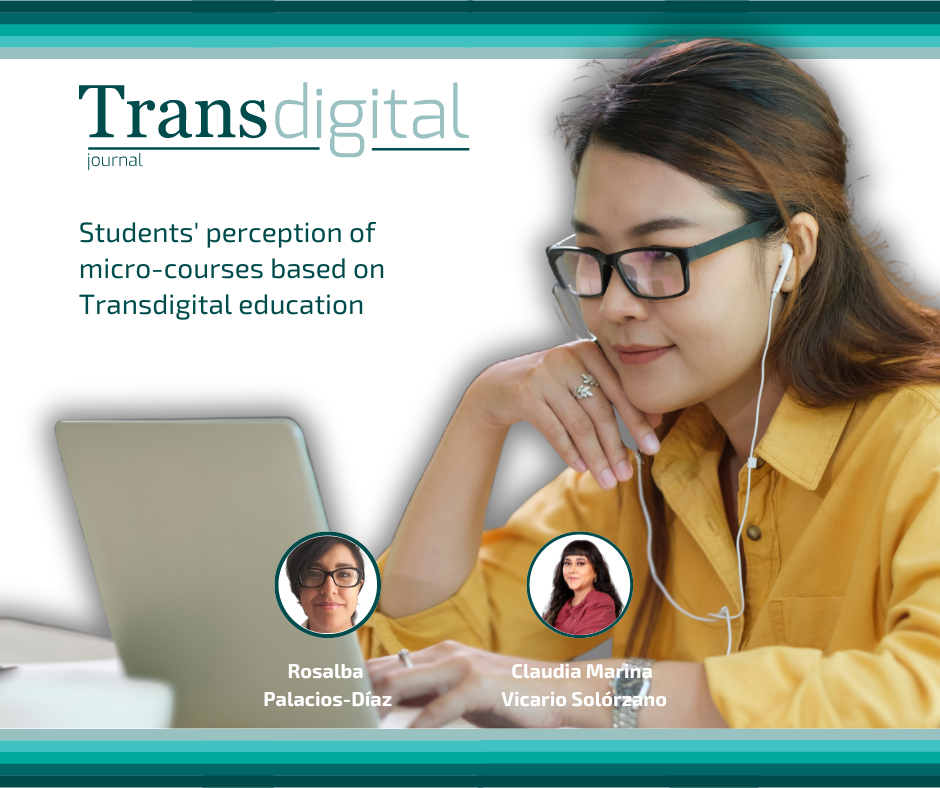Students' perception of micro-courses based on Transdigital education
DOI:
https://doi.org/10.56162/transdigital333Keywords:
Transdigital education, micro-courses, microlearning, grounded theoryAbstract
Online education based its instructional models on educational theories that were consolidated in the pre-digital era. With the accelerated growth of phenomena such as deep learning, data mining and Artificial Intelligence (AI), there is a collective reflection on the operational scope of digital technology. The Transdigital concept focuses on using performative networks with heterogeneous elements in association: everything participates when learning. This research carried out an intervention based on a Transdigital education model using micro-courses. Qualitative data were collected through the first two phases of grounded theory analysis: open and axial coding. The results showed that: 1) the teaching guide during Transdigital learning; 2) the need for simplicity in education; and 3) the presence of AI are aspects required by learners. The obligation of formal institutions to recognize the use of non-formal learning resources by learners, and the effectiveness of micro-courses based on a Transdigital education model, were discussed.
References
Cajamarca, D., Sucuzhañay, J., Pizarro, E., Andrade, L., & Portela, J. (2022). Micro ambientes de aprendizaje para potenciar las habilidades lingüísticas. Revista INTEREDU, 2(5), 201-239.
Correa Gorospe, J. M., Fernández Olaskoaga, L., Gutiérrez-Cabello Barragán, A., Losada Iglesias, D., & Ochoa-Aizpurua Aguirre, B. (2015). Formación del Profesorado, Tecnología Educativa e Identidad Docente Digital. Revista Latinoamericana de Tecnología Educativa, 14(1), 1–16. https://doi.org/10.17398/1695-288X.14.1.45
Crisol-Moya, E., Herrera-Nieves, L., & Montes-Soldado, R. (2020). Educación virtual para todos: una revisión sistemática. Education in the Knowledge Society (EKS), 21, 13. https://doi.org/10.14201/eks.23448
Dwight, J., Boler, M., & Sears, P. (2006). Reconstructing the Fables: Women on the Educational Cyberfrontier. En W. Joel, N. Jason, H. Jeremy & T. Peter (Eds.), The International Handbook of Virtual Learning Environments (1467-1494). Springer.
Educación Transdigital. (2023). Aprende de forma rápida y sencilla. Página web oficial de Educación Transdigital. https://educacion-transdigital.org/
Escudero-Nahón, A. (2014). Identidad y formación de ciudadanías: Propuesta de un Modelo Integrado para el Fortalecimiento de la Ciudadanía Activa [Tesis doctoral, Universitat de Barcelona]. http://hdl.handle.net/10803/130814
Escudero-Nahón, A. (2021). Transdigital Education. Conceptual Cartography. The International Journal of Technologies in Learning, 28(2), 1–20. https://doi.org/10.18848/2327-0144/CGP/v28i02/1-19
Escudero-Nahón, A. (2023). Transdigital: la condición imaginaria del aprendizaje en el transhumanismo. En R. S. Luis Mauricio (Ed.), Imaginación y conocimiento en ciencia, tecnología y educación: retos, posibilidades y realidades (257–277). Gedisa.
Gibbs, G. (2012). El análisis de datos cualitativos en la Investigación Cualitativa. Ediciones Morata.
Gil Mediavilla, M., Lezcano Barbero, F., & Casado Muñoz, R. (2016). Principios éticos en investigación educativa con PLE aplicados a una experiencia internacional. Edutec, Revista Electrónica de Tecnología Educativa, (57), a340. https://doi.org/10.21556/edutec.2016.57.747
Hernández Sampieri, R., Fernández Collado, C., & Baptista Lucio, M. del P. (2010). Metodología de la investigación (5ª ed.). Mc Graw Hill.
Hesse, A., Ospina, P., Wieland, M., Yepes, F. A. L., Nguyen, B., & Heuwieser, W. (2019). Short communication: Microlearning courses are effective at increasing the feelings of confidence and accuracy in the work of dairy personnel. Journal of Dairy Science, 102(10), 9505–9511. https://doi.org/10.3168/jds.2018-15927
Lerís, D., & Sein-Echaluce, M. L. (2011). La personalizaciónn del aprendizaje: un objetivo del paradigma educativo centrado en el aprendizaje. ARBOR. Ciencia, Pensamiento y Cultura, 187, 123-134. https://doi.org/10.3989/arbor.2011.extra-3n3135
Mateus-Nieves, E., & Chala, E. F. (2021). Instrumentalization vs Instrumentation of Microlearning in a Math Class. Al-Ta´Lim, 28(3), 190–203. https://doi.org/10.15548/jt.v28i3.690
Núñez-Urbina, A. A. (2020). La educación en línea y el rol de la motivación. Transdigital, 1(1), 1–14. https://doi.org/10.56162/transdigital8
Palacios-Díaz, R. (2022). Aportaciones a la educación transdigital. Sinéctica, 58, 1–17. https://doi.org/10.31391/S2007-7033(2022)0058-014
Palacios-Díaz, R., & Escudero-Nahón, A. (2021). Percepciones sobre el aprendizaje con tecnología digital en la educación superior [Sesión de congreso]. XVI Congreso Nacional de Investigación Educativa CNIE 2021, Puebla, México. https://www.comie.org.mx/congreso/memoriaelectronica/v16/doc/2034.pdf
Pölzl-Stefanec, E., & Geißler, C. (2022). “Micro-steps” on the route to successful online professional development for Austrian Early Childhood Educators. International Journal of Educational Research, 115, 1–16.
Ponce-López, J.L., Vicario-Solórzano, C.M., & López-Valencia, F. (Coords.). (2021). Competencias Digitales Docentes Metared México, estudio 2021: Resultados de la herramienta de autoevaluación Check-in DigCompEdu. Asociación Nacional de Universidades e Instituciones de Educación Superior. https://estudio-tic.anuies.mx/CompDigDocMetaredMexico2021.pdf
Reina, D., & La Serna, N. (2020). Revisión sistemática sobre el estado del arte de las metodologías para M-learning. Espacios, 41(6), 11-26. https://www.revistaespacios.com/a20v41n06/a20v41n06p11.pdf
Ruíz Díaz Benítez, J. R. (2023). El Micro Aprendizaje. Ciencia Latina Internacional.
Schunk, D. H. (2012). Teorías del aprendizaje: Una perspectiva narrativa (6ª ed.). Pearson.
Siemens, G. (2010). Conectivismo: una teoría de aprendizaje para la era digital. En R. Aparici (Ed.), Conectados en el ciberespacio (77–90). UNED.

Downloads
Autor de correspondencia
El autor de correspodencia se identifica con el siguiente símbolo: *Published
How to Cite
License
Copyright (c) 2024 Rosalba Palacios-Díaz, Claudia Marina Vicario Solórzano

This work is licensed under a Creative Commons Attribution 4.0 International License.
All articles in Transdigital are licensed under a Creative Commons Attribution 4.0 International License. Authors hold the copyright and retain publishing rights without restrictions.









